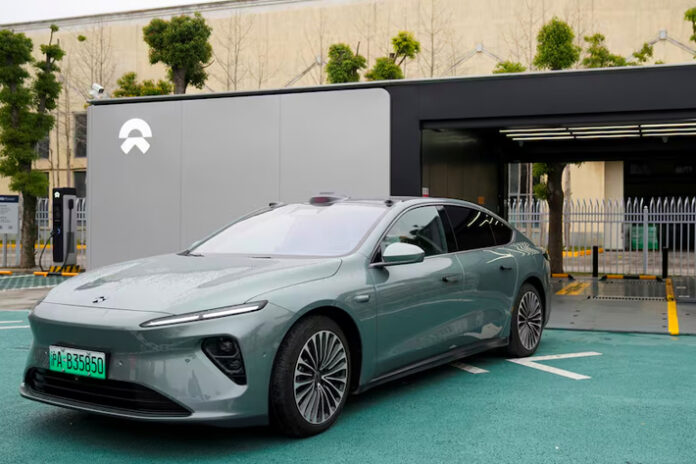Major Asian carmakers and tech giants – such as Toyota, Nissan and Samsung SDI – are racing to develop solid-state batteries.
Trendforce, a Taipei-based intelligence provider, said late last week that pilot “production volumes could have GWh levels by 2027,” as the companies rush to create a battery that offers electric vehicles greater driving range. (GWh is Gigawatt hours – a billion watt hours).
Solid-state batteries (SSBs) are an old technology with a complex manufacturing process that lacks a mature supply chain. Those factors have added to production costs which these big manufacturers have been working to reduce, while also improving safety and energy density.
ALSO SEE: Chinese Solar Firms Shift Bases in SE Asia to Avoid US Tariffs
Some electric vehicles already have semi-solid-state batteries with cell energy densities ranging from 300–360 watt hours per kilogram.
“The initial price of semi-solid-state cells exceeds 1 Chinese yuan (US$0.14),” due to small production scales and the relative immaturity of manufacturing technologies,” Trendforce said.
But it anticipated that increased production and more advanced technological solutions, the cost of semi-solid-state batteries could be significantly reduced over the next decade, as prototypes go into mass production.
There are three ways to make SSBs, based on different types of electrolytes – LMP (lithium-metal-polymer), oxide and sulfide, which all have technological challenges to overcome, according to PV Mag’s Energy Storage newsletter.
The French-Canadian company Blue Solutions has, for example, been producing LMP solid-state batteries for over a decade for electric buses in Europe and Australia.
Smaller, lighter, more power
Solid-state batteries can be smaller and lighter than batteries containing liquid and deliver the same (or more) power.
Those factors drew attention from the Taiwan-based electronics company Hon Hai Precision Industry Co, also known as Foxconn, which signed a memorandum of understanding with Blue Solutions in early 2023 to develop solid-state batteries to power e-bikes.
Blue Solutions is looking to produce a fourth-generation solid-state battery by 2028 for higher-end cars in Europe and North America.
Polymer-based SSBs are relatively mature, but they face challenges with voltage tolerance and ionic conductivity.
Trendforce says oxide solid-state electrolytes offer good stability and moderate costs but are hard to process, plus the “solid-solid” contact between the electrolyte and the cathode/anode active materials leads to higher internal resistance.
Big players, tricky challenges
Meanwhile, sulfide SSBs, tested by Toyota, Samsung SDI, LGES, SK On, CATL, BYD and others, has a tricky chemistry. They are reportedly unstable in air and sensitive to moisture.
Toyota announced a cooperation deal with Idemitsu Kosan in October 2023 to produce SSBs for battery electric vehicles, then said two months ago it had won government approval to ramp up production of an EV with a solid-state battery.
Some analysts are already predicting that Toyota’s venture into the battery sector could be a decisive factor, given Japan’s strong record in creating solid-state batteries and Toyota’s reputation for reliability, which made it the world’s top carmaker for many years.
But the Chinese are also well aware their strong start in the launch of EVs could be overturned by new battery technology.
Reports emerged early this year that Beijing had brought China’s top battery and carmakers together to form the China All-Solid-State Battery Collaborative Innovation Platform (CASIP) in a bid to secure their stronghold on the production of electric vehicles.
So, a global R&D race is well and truly on.
ALSO SEE:
Toyota Gets Solid-State Battery Vehicles Green Light – IE
After Chips, China to Pour Millions Into Solid-State Batteries
BYD Promises Driving Range of Over 2000km With New Hybrid Tech
China in Race With West to Build Best Solid-State Battery – Nikkei
India’s JSW Planning $4.8 Billion EV, Battery Projects in Odisha
China Dominates Clean Energy, as Well as EV Batteries – FP
US, Europe Chase Cheaper EV Battery to Curb China Dominance

